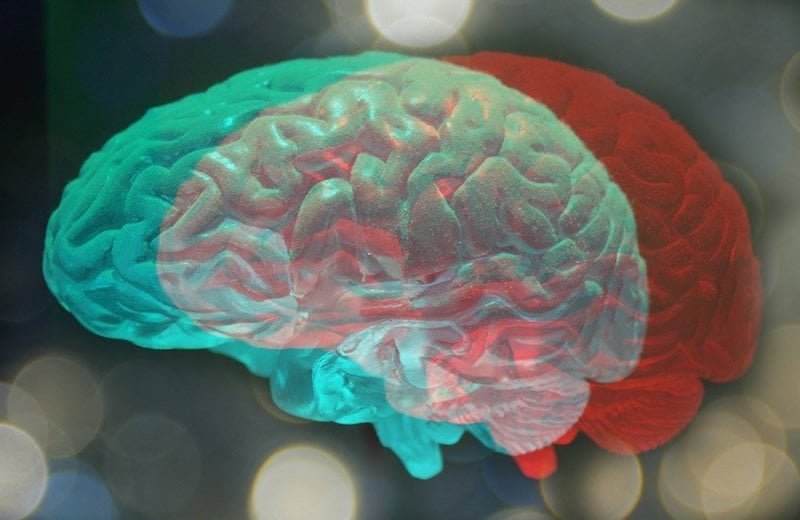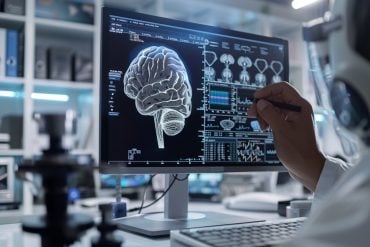Summary: During memory tasks, people with psychosis have different patterns of activity in the prefrontal and mediotemporal brain areas compared to those without the disorder. When exposed to cannabidiol (CBD), the activity of the brain areas became more like those seen in the controls for people with psychosis. Patients reported a decrease in symptoms of psychosis following one dose of CBD. Researchers stress that no definitive conclusions could be made about the effectiveness of CBD use over a sustained period.
Source: King’s College London
Published in Psychological Medicine, the researchers used fMRI scans to examine the brain activity of 13 people with a diagnosis of psychosis under the influence of a single dose of CBD or placebo and 16 controls whilst they were undertaking a memory task. The researchers showed that, during the task, there was a different pattern of activity in the prefrontal and mediotemporal brain areas of people with psychosis under placebo compared to the activity seen in those without psychosis. When those with psychosis were given one dose of CBD, the activation in these brain areas became more like the activation seen in controls.
Senior author on the study, Professor Sagnik Bhattacharyya, from the Institute of Psychiatry, Psychology & Neuroscience (IoPPN), King’s College London said: ‘Our study provides important insight into which areas of the brain CBD targets. It is the first time research has scanned the brains of people with a diagnosis of psychosis who have taken CBD and, although the sample is small, the results are compelling in that they demonstrate that CBD influences those very areas of the brain that have been shown to have unusual activity in people with psychosis.’
CBD is one of over 100 chemical compounds known as cannabinoids that are found in the cannabis plant. There has been recent interest in the use of cannabidiol (CBD) as an alternative to current antipsychotic medicines as it could prove to be more tolerable generally and more effective for a subset of people who do not respond to available antipsychotics. Its use has been associated with a decrease in symptoms of psychosis and changes in brain activity during verbal memory tasks in patients at high risk of psychosis.
The study also showed that activity in the striatum and the activity in hippocampus was more co-ordinated in people with psychosis, indicating there was a greater functional connectivity between these two areas in this group compared to controls. After one dose of CBD this functional connectivity was reduced in people with psychosis and became more similar to that seen in the controls. Those people with psychosis continued on their existing antipsychotic treatment throughout the study.
The results indicate that CBD has a moderating effect on the altered pattern of brain activity in the prefrontal, mediotemporal and striatal areas in people with psychosis. The study also showed that psychotic symptoms did show a decreasing trend after the dose of CBD but researchers highlighted that no definitive conclusions could be drawn about this effect as the study did not look at sustained use of CBD and the sample size was small.

Professor Bhattacharyya added: ‘This study provides important insight into the brain mechanisms behind the antipsychotic effects of CBD. It gives confidence in the antipsychotic potential of CBD by demonstrating that it targets the function of brain regions implicated in psychosis and indicating that even a single dose may ameliorate some of the brain function alterations that may underlie psychosis. The finding that psychotic symptoms may show a trend towards improvement in this group even after one dose of CBD is encouraging, but requires a larger scale clinical trial to investigate if the effects would continue with longer term treatment. The results form an important part of the picture that scientific research is building on the effects of CBD and will help support the case for further clinical trials on the use of CBD in different stages of psychosis as well other neuropsychiatric diseases such as Parkinson’s disease where a proportion of patients may also experience psychotic symptoms.’
Funding: The study was published in Psychological Medicine and funded by the Medical Research Foundation and the NIHR Maudsley Biomedical Research Centre.
Source:
King’s College London
Media Contacts:
Franca Davenport – King’s College London
Image Source:
The image is in the public domain.
Original Research: Open access
“Normalization of mediotemporal and prefrontal activity, and mediotemporal-striatal connectivity, may underlie antipsychotic effects of cannabidiol in psychosis”. Sagnik Bhattacharyya et al.
Psychological Medicine doi:10.1017/S0033291719003519.
Abstract
Normalization of mediotemporal and prefrontal activity, and mediotemporal-striatal connectivity, may underlie antipsychotic effects of cannabidiol in psychosis
Background
Recent evidence suggests that cannabidiol (CBD), a non-intoxicating ingredient present in cannabis extract, has an antipsychotic effect in people with established psychosis. However, the effect of CBD on the neurocognitive mechanisms underlying psychosis is unknown.
Methods
Patients with established psychosis on standard antipsychotic treatment were studied on separate days at least one week apart, to investigate the effects of a single dose of orally administered CBD (600 mg) compared to a matched placebo (PLB), using a double-blind, randomized, PLB-controlled, repeated-measures, within-subject cross-over design. Three hours after taking the study drug participants were scanned using a block design functional magnetic resonance imaging (fMRI) paradigm, while performing a verbal paired associate learning task. Fifteen psychosis patients completed both study days, 13 completed both scanning sessions. Nineteen healthy controls (HC) were also scanned using the same fMRI paradigm under identical conditions, but without any drug administration. Effects of CBD on brain activation measured using the blood oxygen level-dependent hemodynamic response fMRI signal were studied in the mediotemporal, prefrontal, and striatal regions of interest.
Results
Compared to HC, psychosis patients under PLB had altered prefrontal activation during verbal encoding, as well as altered mediotemporal and prefrontal activation and greater mediotemporal-striatal functional connectivity during verbal recall. CBD attenuated dysfunction in these regions such that activation under its influence was intermediate between the PLB condition and HC. CBD also attenuated hippocampal-striatal functional connectivity and caused trend-level symptom reduction in psychosis patients.
Conclusions
This suggests that normalization of mediotemporal and prefrontal dysfunction and mediotemporal-striatal functional connectivity may underlie the antipsychotic effects of CBD.






